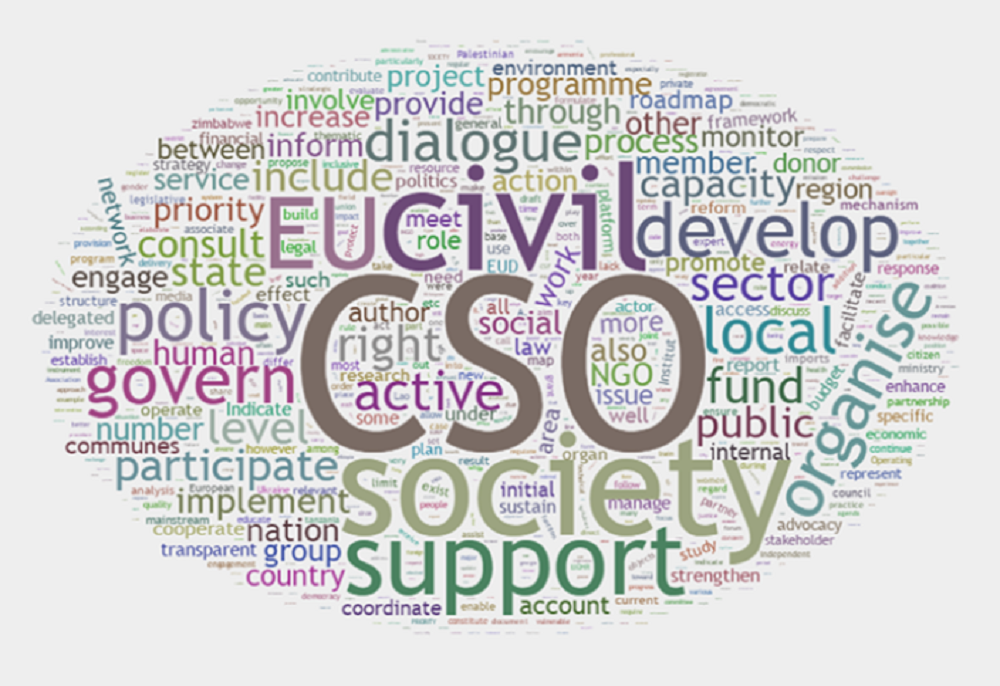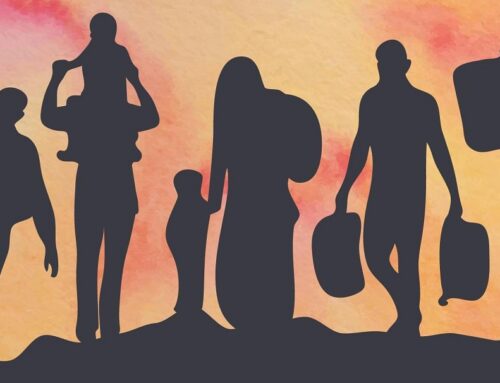Civil society in the MOSO region (Central-Eastern and Southeastern Europe) is essential for the protection of human rights and the strengthening of democratic institutions. However, in recent years, the civic space – thus the environment in which civil society organizations (CSOs) operate (1), has been deteriorating in many countries, signalling a danger to democracy. CSOs have been negatively affected by a lack of financial sustainability, organizational weaknesses, and government attacks.
Now, the organizations suffered another blow in the form of the corona crisis. As countries implemented lockdowns to protect against the virus, CSOs had to adapt their work. They experienced restrictions on movement and assembly, many lost income and had to rapidly transform their services into a digital setting. The previous vulnerabilities of the sector were amplified, however, the crisis also accelerated much-needed transformative processes. The way in which the current circumstances will be managed will leave lasting consequences on the future civic space in the countries. It is therefore necessary to understand how were CSOs affected and transformed as a result of the virus, the policies and the public response. The following article analyses the main patterns of challenges the sector has faced since the start of the pandemic. It considers state policies, donor responses, civic engagement as well as surveys of CSO needs and capacities in each country, in order to determine the best ways to support civil society in these challenging times.
Key findings
While CSOs were differently impacted by the policies of the governments and the support they received from other sources, all regional analyses point to two common patterns:
- Firstly, there is an urgent need to improve the current CSO funding mechanisms. As many projects are postponed or cancelled, it is necessary to be flexible with repurposing existing project funding, as well as providing extra support in the form of core funding to cover salaries and administrative costs. Organizations are facing financial instability and an uncertain future, many had to cut on staff or don’t know how to cover necessary fixed costs in the next months (2). Reassurance and extra help from donors, as well as state aid should be a priority.
- Secondly, organizations are in need of innovation and trainings in the digital sphere. Their digital literacy skills and access to IT equipment vary, but across countries, organizations report a need for support in moving their services online (3, 4). It is also crucial to facilitate innovative approaches to crowdfunding and engaging the public through the internet (5).
- However, the pandemic also accelerated processes necessary to increase overall resilience of the sector. As a result of both the unprecedented circumstances, as well as the sometimes repressive policies of governments, CSOs started cooperating more closely with each other (6) and engaging the public in new ways (7). CSOs were actively involved in providing social services, fundraising for medical staff and assuring access to accurate information about the virus. They have demonstrated their added value to society and their capacity for crisis management for the greater good. This development can eliminate the currently growing alienation between civil society and the general public in the region.
The role of the state
While most governments in the region implemented lockdowns and offered emergency relief packages to businesses and organizations, the effect this had on the civil society varies. It can broadly be put into three categories – supportive, neutral and restrictive.
Supportive states offered help to CSOs in the form of economic and bureaucratic relief or consultancy in crisis management. Some also increased the consultation of CSOs when implementing measures and providing services, increasing the capacity of the sector to engage in advocacy.
In Estonia (8), Lithuania (9), Latvia (10), Kosovo (11), and Moldova (12), governments alleviated bureaucratic burdens from CSOs. The government of Lithuania additionally provided CSOs with consultation on crisis manegement and declared they will not be restricted financially (9). Kosovo, Romania, Serbia and Slovenia included CSOs in state aid packages to alleviate economic burdens (11). In terms of advocacy, Slovakia cooperated with CSOs in delivering social services during the cirsis (13), and Moldova took steps to increase cooperation with civil society in the future (14).
Second come the neutral states. Albania, Bosnia & Herzegovina and Montenegro did not provide specific support to CSOs (11), and organizations in Croatia (11) and Czech Republic (13) reported obstacles in accessing the funding available. Czech CSOs additionally criticized a lack of access to policy makers in advocacy (3).
The restrictive states had the most negative effect on civic space – some diverted funding from CSOs to other causes deemed more urgent. Others introduced laws decreasing the ability of CSOs to recieve foreign funding, to advocate, mobilize and perform their roles as government watchdogs. Sometimes, detrimental laws unrelated to the pandemic were introduced during this time, since people’s attention was centered elsewhere.
In Poland, many organizations were excluded from state aid (13) and the government has also been debating increasing the reporting obligations of CSOs regarding their sources of funding (15). In Hungary, CSOs worry about lack of possibilities for advocacy (13) and the tightening grip on power by the government (16). Additionally, CSOs working on the protection of the rights of the LGBT+ community can expect even harder work conditions, as the pandemic was used as a cover to introduce detrimental laws, like those limiting the rights of transgender persons (17). Bulgaria excluded the majority of CSOs from state aid (11) and started limiting their access to foreign funding (18). North Macedonia redirected funds previously allocated to CSOs, towards healthcare measures (11), and both Ukraine and Belarus introduced laws requiring more extensive financial reporting for CSOs (14).
Positive developments
Despite the financial constraints and the necessity for crisis management, the pandemic accelerated the connections between CSOs and the public. In Bulgaria, the situation prompted CSOs to establish a network of cooperation and share best practices, a framework which can significantly improve their resilience also in face of other future challenges (11). CSOs in Ukraine were disseminating protective equipment (19) and Polish CSOs were innovating new ways of protesting amid restrictions (20). Lithuanian CSOs widely engaged with the public, supplemented social and humanitarian services and engaged in hackathons aimed at finding solutions to the newly arisen problems (21).
In Belarus, the pandemic response was largely driven by civil society. CSOs were supplementing the services of the state, such as fundraising to supply the medical staff with protective equipment (22) and sharing essential information about the virus (23). Civil society has thus established itself as a more trustworthy partner than the government (24).
The public has supported the efforts of CSOs in these times. In Slovakia (25) and Czech Republic (26), CSOs experienced a surge in crowdfunding and donations to campaigns, even those not directly related to the pandemic. The state of crisis inspired people to show solidarity and be more engaged (27).
Additionally, the process of coallition building and cooperation between CSOs, which already started earlier as a result of the vulnerability of the sector (28) has grown into the establishment of transnational networks (29). Therefore, while the sector is surely vulnerable now, it may rise from the crisis stronger, as a result of greater cooperation within the sector and engagement of the public.
Conclusion
The hard financial situation and difficulty with moving online and continuing projects seriously impair the functioning of civil society in the MOSO region. Additionally, many states took further measures detrimental to the future capacity of the sector to be financially sustainable and to successfully engage in advocacy. However, the pandemic has also accelerated the digitalization and coalition building which the sector has long needed. If supported, these positive developments could significantly strengthen civil society in the region also in the face of democratic backsliding and rising anti-NGO sentiments. Donors, international agencies and citizens need to protect the freedoms of CSOs, provide them with additional financial and organizational support, and cooperate to find new possibilities for digital engagement and crowdfunding.
References
- https://civicspacewatch.eu/what-is-civic-space/
- https://thebalkanforum.org/en/online-poll-the-impact-of-covid-19-on-civil-society-organizations-csos-in-the-western-balkans
- https://osf.cz/wp-content/uploads/2020/05/Nadace-OSF_pruzkum_COVID-2020.pdf
- https://euprostir.org.ua/en/stories/149417
- http://partnersalbania.org/wp-content/uploads/2020/04/Support_NPO_Sector_Adaptability_to_Covid-19_Emergency_Assessment_Report.pdf
- http://www.balkancsd.net/novo/wp-content/uploads/2020/04/18-1-Solidarity-in-Times-of-Corona-Crises_-Collection-of-Regional-and-International-CSO-Responses.pdf
- https://civicspacewatch.eu/solidarity-amid-covid-19-crisis/
- http://edf-feph.org/covid19estonia
- https://socmin.lrv.lt/uploads/socmin/documents/files/veiklos-sritys/Socialines%20politikos%20aktualijos/Rekomendacijos%20NVO%20karantino%20laikotarpiu.pdf
- https://monitor.civicus.org/updates/2020/05/15/government-responds-ngo-sector-concerns-during-covid-19-crisis/
- http://civicspacewatch.eu/wp-content/uploads/2020/06/78-6-Balkan-Civil-Society-in-the-COVID-19-Crisis-Part-II.pdf
- https://balkaninsight.com/2020/06/12/moldova-adopts-ngo-law-releases-eu-financial-aid
- http://visegradinsight.eu/app/uploads/2020/06/Civil-Society-Futures-in-Central-Europe-DemocraCE-European-Futures-Report-III.pdf
- https://csometer.info/wp-content/uploads/2020/06/CSO-Meter-Overview-January-May-2020.pdf
- https://balkaninsight.com/2020/05/27/endangered-sanctuaries-how-covid-19-could-close-polands-animal-shelters/
- https://carnegieeurope.eu/2020/06/23/coronavirus-and-european-civil-society-pub-82112
- https://www.civicus.org/index.php/media-resources/news/interviews/4489-hungary-trans-people-are-having-our-rights-being-taken-away
- https://ecnl.org/bulgaria-new-proposals-to-stigmatize-csos-receiving-foreign-funding/
- https://www.peaceinsight.org/blog/2020/07/when-civil-society-responds-covid-19-ukraine/
- https://carnegieeurope.eu/2020/06/23/coronavirus-and-european-civil-society-pub-82112
- https://lietuva.lt/en/naujienos/the-other-side-of-covid-19-stagnant-civil-society-in-the-baltic-state-rose-up-to-a-challenge/
- https://www.wilsoncenter.org/event/webcast-belaruss-emerging-civil-society-time-covid-19
- https://www.politico.eu/article/aleksander-lukashenko-belarus-coronavirus-covid19-pandemic-election
- https://www.opendemocracy.net/en/odr/belarus-covid19-social-contract-en/
- https://darujme.sk/blog/rekordna-jar-2020-v-darovani/https://www.darujme.cz/clanek/stedrost-ceskych-darcu-roste-i-bez-covid-kampani/
- https://www.darujme.cz/clanek/stedrost-ceskych-darcu-roste-i-bez-covid-kampani/
- https://svetneziskovek.cz/aktualne-z-nezisku/obcanska-spolecnost-vraci-uder-jak-koronavirus-zveda-vlnu-solidarity-2
- https://carnegieeurope.eu/2020/03/12/how-european-civil-society-is-pushing-back-against-democratic-erosion-pub-81254)
- https://visegradinsight.eu/civil-society-central-europe-hard-to-ignore/




